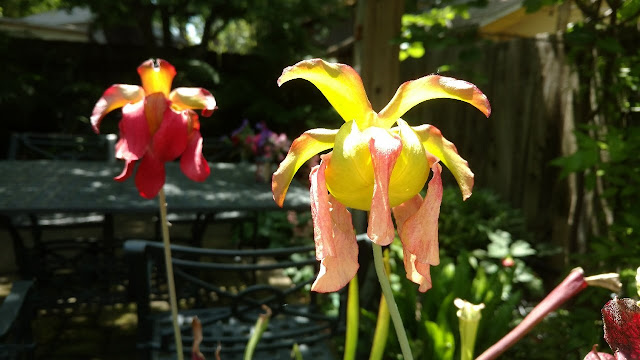
Sacramento Bromeliad and Carnivorous Plant Society hosts 52nd annual show and sale

|
|
Pitcher plants are among the carnivorous plants that do well outdoors in
the Sacramento area. See more plants at the show and sale this weekend. (Photo:
Debbie Arrington)
|
In most gardens, bugs eat plants. But these plants eat bugs.
Discover the fascinating world of carnivorous plants during the 52nd annual Sacramento Bromeliad and Carnivorous Plant Society Show and Sale, set for this Saturday and Sunday, June 18 and 19, at Shepard Garden and Arts Center.
See hundreds of intriguing specimens, with several species that are right at home in Sacramento. Pitcher plants, for example, can be grown outdoors in our area. They do particularly well as part of a backyard water feature such as a half wine barrel or small pond; their roots get the boggy conditions they prefer while the plants have access to insects that may fly by.
Because they evolved to grow in such poor soil, carnivorous plants get most of their nourishment from insects that can become trapped in their specialized (often sticky) foliage. Likewise, bromeliads trap moisture and nutrients in the center of their swirl of colorful foliage.
Club members will be on hand to answer questions and offer advice. An excellent selection of plants will be offered for sale. Find pitcher plants, sundews, butterworts and other bug eaters as well as tillandsia (air plants) and bromeliads in a rainbow of hues.
Hours are 9 a.m. to 4 p.m. Saturday and Sunday. Admission and parking are free.
Shepard Center is located at 3330 McKinley Blvd., Sacramento, in McKinley Park.
Details and directions: www.sgaac.org .
Comments
0 comments have been posted.Sacramento Digs Gardening to your inbox.
Food in My Back Yard Series
April 1: Don't be fooled by these garden myths
March 25: Fertilizer tips: How to 'feed' your vegetables for healthy growth
March 18: Time to give vegetable seedlings some more space
March 11: Ways to win the fight against weeds
March 4: Potatoes from the garden
Feb. 25: Plant a fruit tree now -- for later
Feb. 18: How to squeeze more food into less space
Feb. 11: When to plant? Consider staggering your transplants
Feb. 4: Starting in seed starting
Sites We Like
Garden Checklist for week of March 30
Your garden doesn’t mind April showers. Get busy now to enjoy those future flowers.
* Get ready to swing into action in the vegetable garden. As nights warm up over 50 degrees, start setting out tomato, pepper and eggplant transplants.
* From seed, plant beans, beets, cantaloupes, carrots, corn, cucumbers, melons, pumpkins, radishes and squash. (Soak beet seeds overnight in water for better germination,)
* Plant onion sets.
* In the flower garden, plant seeds for asters, cosmos, celosia, marigolds, salvia, sunflowers and zinnias.
* Transplant petunias, zinnias, geraniums and other summer bloomers.
* Plant perennials and dahlia tubers for summer bloom.
* Transplant lettuce and cabbage seedlings.
* April is the last chance to plant citrus trees such as dwarf orange, lemon and kumquat. These trees also look good in landscaping and provide fresh fruit in winter.
* Smell orange blossoms? Feed citrus trees with a low dose of balanced fertilizer (such as 10-10-10) during bloom to help set fruit. Keep an eye out for ants.
* Apply slow-release fertilizer to the lawn.